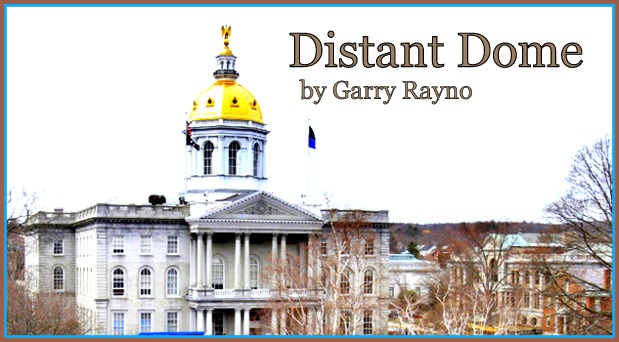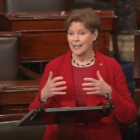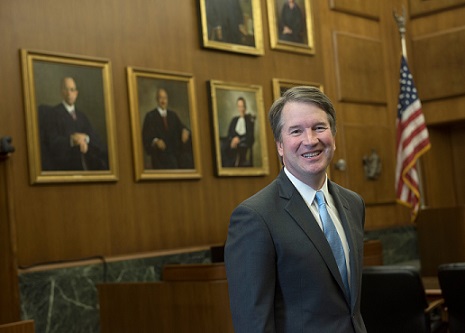Distant Dome is co-published by InDepthNH.org and Manchester Ink Link
By GARRY RAYNO, Distant Dome
We live in a hyper partisan age, in Washington and in Concord.
It wasn’t always so but the big money flowing into politics unleashed by the Citizens United US Supreme Court decision has made political campaigns extremely expensive.

Garry Rayno
Two decades ago, some of the more expensive state Senate campaigns used to cost $40,000 or $50,000 but now are often well over $100,000.
A governor’s race in New Hampshire not long ago cost around $1 million but now cost five or six times that with all the outside, money often dark, following into the campaigns.
Candidates running for office today need more and more money to be competitive and become more and more beholden to the people giving them the money be it the Koch brothers or George Soros.
To be a good investment, candidates have to be in the majority to push through the funders’ agendas. Campaigns become do or die battles for the two parties who seek to make their advantage permanent either by gerrymandering districts, suppressing voting blocks or stacking the Supreme Court with liberal or conservative judges.
This creates an environment where major initiatives such as tax cuts or the Affordable Care Act are passed by only one party.

Wikipedia
Former Gov. John Winant
When former Democratic President Franklin Delano Roosevelt pushed through Social Security in the 1940s with the help of former New Hampshire Gov. John Winant, a Republican, the GOP members of Congress were not fans.
But once it was approved, Republicans helped to make adjustments in the law to make it better. No such work was ever done on the Affordable Care Act. Democrats were afraid to revisit the act because Republicans vowed to repeal it if they had an opportunity.
Consequently some of the significant problems with the law have never been fixed.
Bipartisanship has become a dirty word, but it is what is needed to create lasting legislation or programs.
After watching the New Hampshire legislature for nearly two decades, it is clear bipartisan legislation creates something lasting that works.
With bipartisan legislation both parties receive some of what they need, and neither party can use it as a weapon in the next election.
During the 70s, 80s and early 90s, the legislature was controlled by Republicans with governors mostly from the same party. The legislatures had a core group of about 50 lawmakers — both Republicans and Democrats — who could be counted on to do the right thing for the state.
The core group produced many things we take for granted today, such as land conservation, clean air and water programs and decentralizing the state’s mental health and developmentally disabled programs.
More recently, the legislature was controlled by Republicans when the Supreme Court handed down its Claremont I and II education decisions.

U.S. Sen Jeanne Shaheen, D-NH.
However, there was a Democratic Governor, Jeanne Shaheen, who touted her bipartisanship and ability to work with both sides of the aisle.
Finding a solution was not easy. The first attempt to address the education funding issue was a battle between those favoring an income tax and those touting expanded gambling.
When neither side could hold a majority long enough to make either proposal viable, lawmakers from both parties came together to craft a solution that in one form or another remains in place today, although most agree it is in dire need of a major overhaul.
When the state retirement system needed fixing earlier this century, Republicans held super majorities in the House and Senate and sought to solve the problem solely on the backs of public employees. Democratic governor John Lynch was able to soften the blow but the focus remained on reducing employee benefits. The state made the problem worse by eliminating its share of retirement system costs it had traditionally paid for municipal, school and county employees and that drove up local property taxes.

Former Gov. John Lynch
The super majorities were enough to push through stand-your-ground legislation, loosen concealed carry requirements and cut in half state aid to the university and community college systems despite Lynch’s veto power.
When Republicans took control of the governor’s office and the legislature after the 2016 election, they were able to eliminate the concealed carry permit and place greater restrictions on voting rights but could not pass school vouchers or make New Hampshire a right-to-work state, tenants of the party’s platform.
Yet in that time, Republicans and Democrats came together to address the state’s opioid addiction epidemic, still an on-going concern, fund full-day kindergarten, pass same sex marriage and kill an attempt to repeal it.
Congress too has come together to try to address the opioid epidemic in bipartisan ways, but most other issues are pitched battles between the two parties.
The hyper partisanship has created massive swings as Democrats reverse Republican initiatives and when the GOP takes control, they eliminate Democrats’ work as is happening with President Trump eliminating anything former President Obama touched.
The inevitable backlash comes and things swing back the other way making whomever is president ineffective and unable to move his or her agenda forward for the rest of their tenure. And then we start the cycle over again.
The drastic swings are not good for the country, business or citizens. The uncertainty breeds instability in business, politics and daily lives.
The recent confirmation process for Supreme Court Justice Brett Kavanaugh was a win-at-any-cost battle from both parties, who will then use his nomination for political gain.
Once it was over, you ask who was served and who benefited. Did American citizens benefit or was it only the politicians and their parties?
The founding fathers tried to protect against the tyranny of the majority, but the protections are not strong enough in today’s social-media-driven, upside-down world where the privileged are victims and their victims the perpetrators.
The path back to bipartisanship is going to be very difficult, and somewhere along the route, the extraordinary amount of money dumped into elections needs to be addressed.
It is naive to think we are ever going back to the time when issues too complicated to be distilled into sound bytes sway elections.
But we have to be able to have discussions and arguments that do not devolve into name calling and demonization.
After last week, civil discussion is a long way from today’s political climate.
Garry Rayno may be reached at garry.rayno@yahoo.com
Distant Dome by veteran journalist Garry Rayno explores a broader perspective on the State House and state happenings. Over his three-decade career, Rayno covered the NH State House for the New Hampshire Union Leader and Foster’s Daily Democrat. During his career, his coverage spanned the news spectrum, from local planning, school and select boards, to national issues such as electric industry deregulation and Presidential primaries. Rayno lives with his wife Carolyn in New London.





